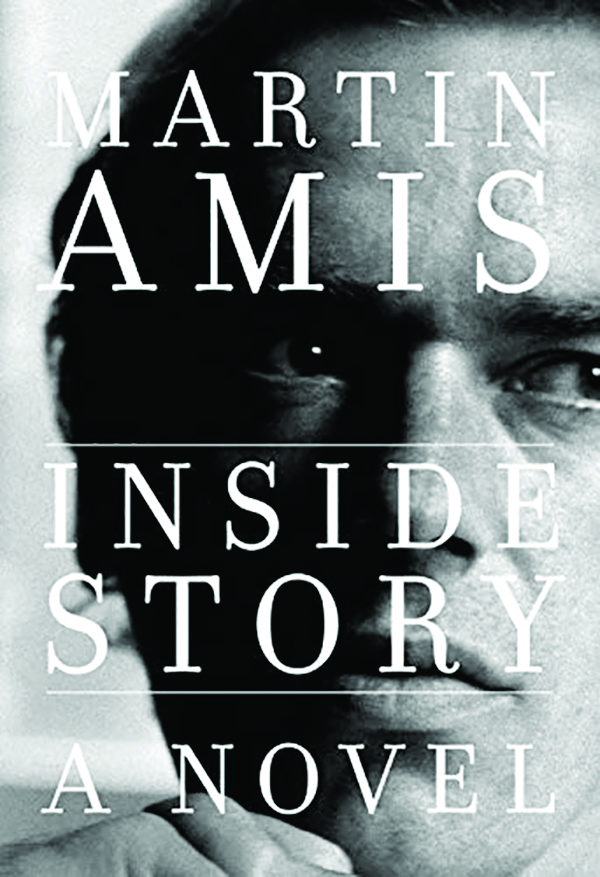David Foster Wallace once turned up at a girlfriend’s apartment in the late 1990s and began to inspect her bookshelves. “You sure have a lot more Martin Amis than me,” he said. “Is everything OK?” Reading Amis’s new novel, Inside Story, you will, like Wallace, be wondering if everything is OK in Amisland. Formally, Inside Story is repetitive, loopy, and maundering. But most frighteningly, given the author, it is genial to the point of prissiness. Amis, the snarly king of Brit lit, the champion womanizer, the difficult prose idolater, has chilled out. He’s mellowed. And he wants to prove it.

“Welcome! Do step on in — this is a pleasure and privilege. Let me help you with that.” This is how Inside Story opens, with Amis welcoming us into his Brooklyn brownstone, telling us about his cat, his second wife, and his children. He offers us a spot on the sofa by the fire and our choice of deluxe whiskies. Snacks, too. Amis is softening us up, like a grandfather preparing to cut the ribbon on a final (lengthy) reminiscence. After 47 years of novel writing, Amis wants something that he usually gives himself and rarely gives his readers: sympathy. “You are my guest,” Amis writes, expansively. “You are my reader.”
Inside Story is all over the place. Amis’s main task lies in bidding farewell to the departed. To his godfather, the poet Philip Larkin, his surrogate father, the novelist Saul Bellow, and his best friend, the essayist Christopher Hitchens. Among these valedictions, there is a novel, an “erotic picaresque” of Amis’s relationship with Phoebe Phelps, a former escort. Phelps is one of those signature women who slink around the Amis canon, like Nicola Six in London Fields or Selina Street in Money. They drive critics as mad as they do the men in the novels. Phoebe is fruitfully damaged, a nebula of sexual charisma and flinty amorality. Does she seem real? Well, does Donald Duck?
Throughout, there are little essaylets, footnotes, and bursts of near-tabloid gossip. Amis peddles opinions on the Iraq War, Israel, Adolf Hitler, 9/11, and the European migrant crisis, all in a chapter lifted word-for-word from a story he published in the New Yorker five years ago. Turning his lordly attention to the next generation of novelists, Amis offers advice on “literary decorum” in a series of subchapters. Novels, apparently, shall not traffic in dreams, religion, and sex. To which you reply: What else is there to write about? Thankfully, literary decorum only goes so far. He offers withering judgments on writers not named Martin Amis, Vladimir Nabokov, or Saul Bellow. Virginia Woolf is dragged for anti-Semitism. (Leonard, her husband of 31 years, was Jewish). Graham Greene “could hardly hold a pen.” Poor Elena Ferrante is poleaxed by a footnote. Ezra Pound, John Wyndham, and T.S. Eliot are casually dispatched as “two nutters and a monarchist.” These asides are lively and entertaining. But this cruel mandarin voice, the critical Amis, struggles to find its pitch within Inside Story. The self-portrait of the artist as a sentimental, generous old man grates with the waspish asides.
Once you sand away everything else, this is a book about death. Amis is still talking to Larkin, Bellow, and Hitchens. Like Bellow’s final novel, Ravelstein, a triumphant resurrection of his friend Allan Bloom, Inside Story wants to raise the dead. There are dinners with Bellow and many, many drinks with Hitch. Bellow’s coast into Alzheimer’s is as distressing as it ought to be. Amis recalls Bellow’s eyes, “oystery with time but still rich and concentrated, full of things you badly wanted to know.” Amis worshiped Bellow. Even before their first meeting in October 1983, he yearned for the birth of a “flattering friendship.” It happened. Bellow’s decline, like Kingsley Amis’s in Experience, is registered with pained sensitivity. By 2003, Bellow was no longer fully present. For Amis, it’s “as if a host of Goths or Vandals had come and gone; everything that was beautiful or holy had been looted or wrecked.”
Hitchens introduced Amis to Bellow’s fiction. And it’s Hitch who stands by with boozy wisecracks when things go from bad to bizarre with Phoebe. (For a few hundred pages, she has Amis worried that Larkin, not Kingsley, is his father.) The partnership between Hitchens and Amis is the emotional engine of Inside Story. Amis quotes from Hitchens’s memoir Hitch-22 so many times you feel as if you’re reading that one again, too. It’s forgivable. Hitchens, for all his faults, remains greatly missed. His romantic bombast and his hard living were fiercely attractive to Amis, whose fiction always gravitates toward extreme types. Hitchens “was obscurely compelled to embrace complication, to test his courage, to walk into his doubts and fears.” Were there ever difficulties between them? Hitchens’s love for Amis may have been more than brotherly in the early days. And Amis admits to competitive feelings when Hitchens was dating Anna Wintour. But these complications never derail their friendship. Amis never knew enough about politics to threaten Hitchens; Hitchens never wrote well enough to threaten Amis. When Amis joins the “death watch” at Hitchens’s bedside in Houston in 2011, he finds the right words for his friend:
Is everything OK? At the end, Amis thanks his readers for their clemency, as if he knows that after Inside Story, he will need it. It’s a final wish. He’s confused his life with literature here, but only the hardest heart would deny what he’s given to other lives through his writing.
Will Lloyd is a writer from London, England.
